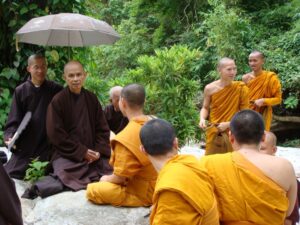A social movement called Engaged Buddhism teaches us that we can apply the concept of mindfulness to difficult situations in life to promote inner peace. You may find that Engaged Buddhism is the practice you did not know you needed.
While many of us are aware of the benefits of Buddhist teachings like meditation and mindfulness it can be challenging to put them into action. The Buddhist monk Thích Nhất Hanh says we can by practicing Engaged Buddhism. His approach takes Buddhist teachings and ethics and integrates them into our daily circumstances or social issues.
The American Psychological Association finds that mindfulness can assist with self-control, mental clarity, emotional intelligence, concentration, and empathy. The benefits of mindfulness are not a new concept for Buddhists who have been practicing this for thousands of years.
Thích Nhất Hạnh, who was already living in a Buddhist monastery from age 16, was disturbed by the horrors of the Vietnam war. Up until 1963 he had been lecturing in theology at Princeton University but chose to return to his home country to assist with non-violent anti-war protests. He would go on to become a spiritual teacher, poet, human rights activist and write over 130 books.
You may never achieve Nirvana or save the world, but according to Thích Nhất Hạnh, you can create positive change by practicing engaged Buddhism. More than ever, it has become crucial to look after our spiritual development. Sometimes, reminding ourselves that no situation is permanent can be helpful. This concept is one of Engaged Buddhism’s central beliefs and teachings.
Here are some sayings by Thích Nhất Hạnh to illustrate what the essence of Engaged Buddhism looks like in a modern setting.

1. “Drink your tea slowly and reverently, as if it is the axis on which the world earth revolves – slowly, evenly, without rushing toward the future.”
A standard morning for many of us can involve its fair share of organised chaos. Perhaps getting the kids out of the door or rushing to work.
Find time to sit with your coffee for two minutes and block out distractions. Take note of how it tastes, how it makes you feel, and what is happening in your body as you sip. Practice finding joy in the smallest of things and grounding yourself in the moment.
Thích Nhất Hạnh teaches that changing our mindset begins with the smallest of practices.

2. “The present moment is filled with joy and happiness. If you are attentive, you will see it.”
Happiness is not only something that we can stumble into or happens to us. We can work to generate happiness in our lives also, according to Engaged Buddhism. Stress is a powerful emotion and can easily obscure the many good things happening in that very moment.
Thích Nhất Hạnh teaches that happiness sometimes does not look like what we expect it to.

3. “Letting go gives us freedom, and freedom is the only condition for happiness. If, in our heart, we still cling to anything – anger, anxiety, or possessions – we cannot be free.”
Letting go is one of the most important teachings in Engaged Buddhism, and something Thích Nhất Hạnh bought up frequently. Of course, it is easier said than done and is something you need to practice.
This might go as deep as realising your stress in the present day is rooted in insecurity from childhood. Or it could be as simple as journaling before bed to release whatever stressful things have happened in your day.

4. “Feelings come and go like clouds in a windy sky. Conscious breathing is my anchor.”
Conscious breathing does not have to be burning incense and sitting cross-legged for hours at a time. If you are emotional, stressed or agitated, try taking four deep breathes in, holding for four, and then releasing for four.
If you can do this even a few times, you might feel your heart rate drop and your body physically calming down. It is easy to think in the moment that your emotions are ruling you, but according to Thích Nhất Hạnh, they are temporary.

5. “Sometimes your joy is the source of your smile, but sometimes your smile can be the source of your joy.”
This leads us back to the idea that we can generate happiness for ourselves. The path to a happy, peaceful, and truly fulfilling life is hard work. It can be uncomfortable, bring up old wounds or mean that we must muster all our strength that day to get through it.
According to Engaged Buddhism, the everyday occurrences in life that may cause stress are moments that teach us. Likewise, the mundane routines and chores in daily life can be transformed into practices of mindfulness and identifying happiness.

These things may seem simple and obvious, but that is what makes them so effective and powerful. Adopting these practices and mindsets is getting to the heart of what Thích Nhất Hạnh meant by engaged Buddhism. We may not achieve enlightenment in our lifetime, but we can make peace with ourselves and the world in small ways each day.







